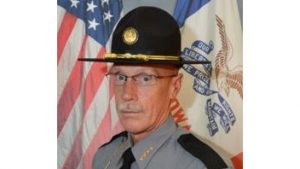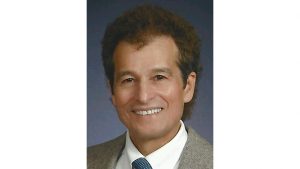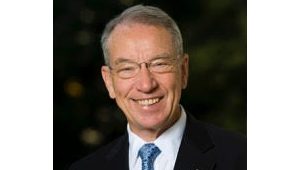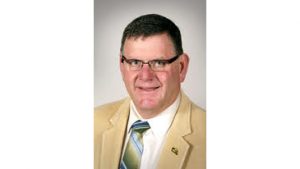Efforts to legislate against human trafficking have increased in recent years, at both the state and federal levels, but there may still be a lot left to be done.
According to a 2014 notice from the Human Smuggling and Trafficking Center, Interstate 80 is a key west-east trafficking route that starts in California and passes through Iowa on its way to New Jersey.
“There are no geographic, economic, racial, gender boundaries,” said Dave Lorenzen, the chief of motor-vehicle enforcement at the Iowa Department of Transportation. “Anytime there’s money involved, that’s what it’s all about for the people involved.”

Data compiled by Polaris and the National Human Trafficking Hotline make up one of the largest available data sets on human trafficking in the U.S. From 2011 to 2014, Polaris rated each state in the nation based on its human-trafficking and victim-assistance laws.
According to the 2014 Polaris report, Iowa has done well by passing several laws to combat human trafficking, but it could do more to implement new laws and improve existing ones.
Meanwhile, Iowa landed near the bottom of Polaris’ list when it came to victim-assistance laws. In 2014, Polaris said the state had done very little to legislate protections for victims of human trafficking.
The Iowa Network Against Human Trafficking and Slavery, a volunteer organization dedicated to ending human trafficking, has worked on many pieces of state legislation designed to improve victim services and address human trafficking and child abuse.
At the beginning of 2015, Iowa enacted a law to protect minors who are victims of human trafficking.
“That allows the attorneys to refer [minors] who were trafficked … for service, so that the minors who are victims are not prosecuted and not labeled as prostitutes,” said Network Board Chair George Belitsos.

He said the Network is particularly proud of a state law signed in 2016 to create the Office to Combat Human Trafficking in the Iowa Department of Public Safety.
The office oversees efforts to combat trafficking in Iowa. The law requires the office to submit a report to the Iowa Legislature by Nov. 1 on occurrences and efforts to combat human trafficking in the state.
Another state law signed in May allows cities and counties to adopt their own ordinances regulating massage-therapy businesses.
“That way local law enforcement can inspect at any time, can ask for background checks, can really monitor to ensure that what’s happening at all the massage business in their jurisdiction, city, or county, that they’re legitimate,” Belitsos said.
So far, he said, the only city to have passed a law is Johnston. It began requiring massage-therapy businesses to get an operating license in July 2016. Since then, several massage-therapy businesses have closed.
“We’re urging other cities in the state to follow their lead and begin to regulate massage businesses,” Belitsos said.
RELATED: Hotel staff train against trafficking
Belitsos said the Network would also like to see legislation to extend the protections offered by Iowa’s rape-shield law to victims of human trafficking.
Rape-shield laws prevent a defendant from introducing evidence or cross-examining rape victims concerning their sexual history. Currently, Iowa’s rape-shield law does not cover victims of human trafficking.
Belitsos said the Network would also like to see the Legislature adopt Erin’s Law, a human-trafficking and child-sexual-abuse-prevention measure that promotes education about child sex abuse and assault in public schools.
Erin’s Law has been passed in more than 30 states and is pending in 15 states, one of which is Iowa, where it’s been introduced in the state Legislature every year for the past three years.
“This last year, [Erin’s Law] got through the House as a study bill, but it didn’t get through the Senate,” Belitsos said.
At the federal level, Sen. Chuck Grassley, R-Iowa, has worked to pass legislation focused on improving the screening and identification of victims and improving law-enforcement training and coordination efforts in matters of human trafficking.

In terms of how the United States handles human trafficking, the country was rated among the most rigorous in the world in the most recent Trafficking in Human Persons Report, released June 2016 by the U.S. State Department.
Recent federal legislation Grassley has been involved in include the Trafficking Victims Protection Act and the Abolish Human Trafficking Act, both of which passed in the Senate on Sept. 11 and are awaiting votes in the House.
RELATED: Senate moves on human trafficking
The Trafficking Victims Protection Act authorizes grant money for, promotes and improves training programs and victim services, and improves federal law-enforcement coordination to respond to human trafficking.
The Abolish Human Trafficking Act reauthorizes funds for victim services and enhances penalties for offenses.
Carol Smolenski, the executive director of End Child Prostitution and Trafficking USA, said the Stop Enabling Sex Traffickers Act is another human-trafficking bill that was recently introduced in the U.S. Senate.

The Stop Enabling Sex Traffickers Act would amend the Communications Decency Act to make it easier to stop child sex traffickers from selling children online, Smolenski said. So far, the bill has 32 cosponsors, but Iowa’s senators are not among them.
“It’s definitely bipartisan,” Smolenski said. “I actually reached out to my colleagues in Iowa; I was really surprised to see that Iowa’s senators are not on board. … I know Sen. Grassley has been very active on this issue.”
The bill is currently under consideration with the Senate Commerce Committee. George Hartmann, Deputy Press Secretary for the U.S. Senate, said since Grassley is not on the Commerce Committee, he’s waiting to evaluate what changes are made in committee before deciding whether to support the bill.
A version of the bill has been introduced in both the U.S. House and Senate, but Smolenski said her organization strongly supports the Senate version.
“It’s quite carefully, narrowly crafted,” she said. “It’s specifically aimed at keeping kids from being bought and sold on the Internet.”
Smolenski said the careful language is designed to appease big tech companies that are afraid the bill could introduce too much regulation of the Internet.
“It’s written very carefully to make it possible for somebody … to go into civil court and make the case that they’ve been harmed and that the company has to compensate,” Smolenski said. “Up until now … the complainant can’t even get into court; it’s immediately dismissed.”
The law would allow state prosecutors to prosecute the online buying and selling of children using federal human-trafficking laws.
Even though the bill addresses the Internet, Smolenski said, it will have an effect on Iowans.
“It’s an issue in every state,” she said. “It just takes a couple minutes to go online … and find all the ads for women and girls in Iowa.”
Smolenski said backpage.com is the go-to place for online trafficking, and that many human-trafficking cases can be traced back to the site.
Meanwhile, away from the information superhighway, the Iowa DOT has partnered with the nonprofit Truckers Against Trafficking to stop human trafficking on real-world roadways.
Truckers Against Trafficking helps the DOT put on training workshops for federal, state, county, and local law enforcement. It also helps educate commercial-vehicle drivers — truckers — on how to identify and report human trafficking.
“We also reach out to all our travel plazas and truck stops in the state … visiting with drivers as they come off the road. We train a lot of the travel-plaza and truck-stop employees,” Lorenzen said. “Truckers aren’t the only ones who see cases of human trafficking, but they’re on the road 24/7.”
Lorenzen said state legislation to mandate training for commercial-vehicle drivers when they receive their licenses — something many other states are already doing — would be a big step in the right direction.
“The more aware we can have folks, the better,” Lorenzen said.
State Sen. Kevin Kinney, D-Oxford, said the state has greatly improved its human-trafficking laws and policies since 2006. Raising awareness has been a big part of that, he said, but public understanding is still lacking.




